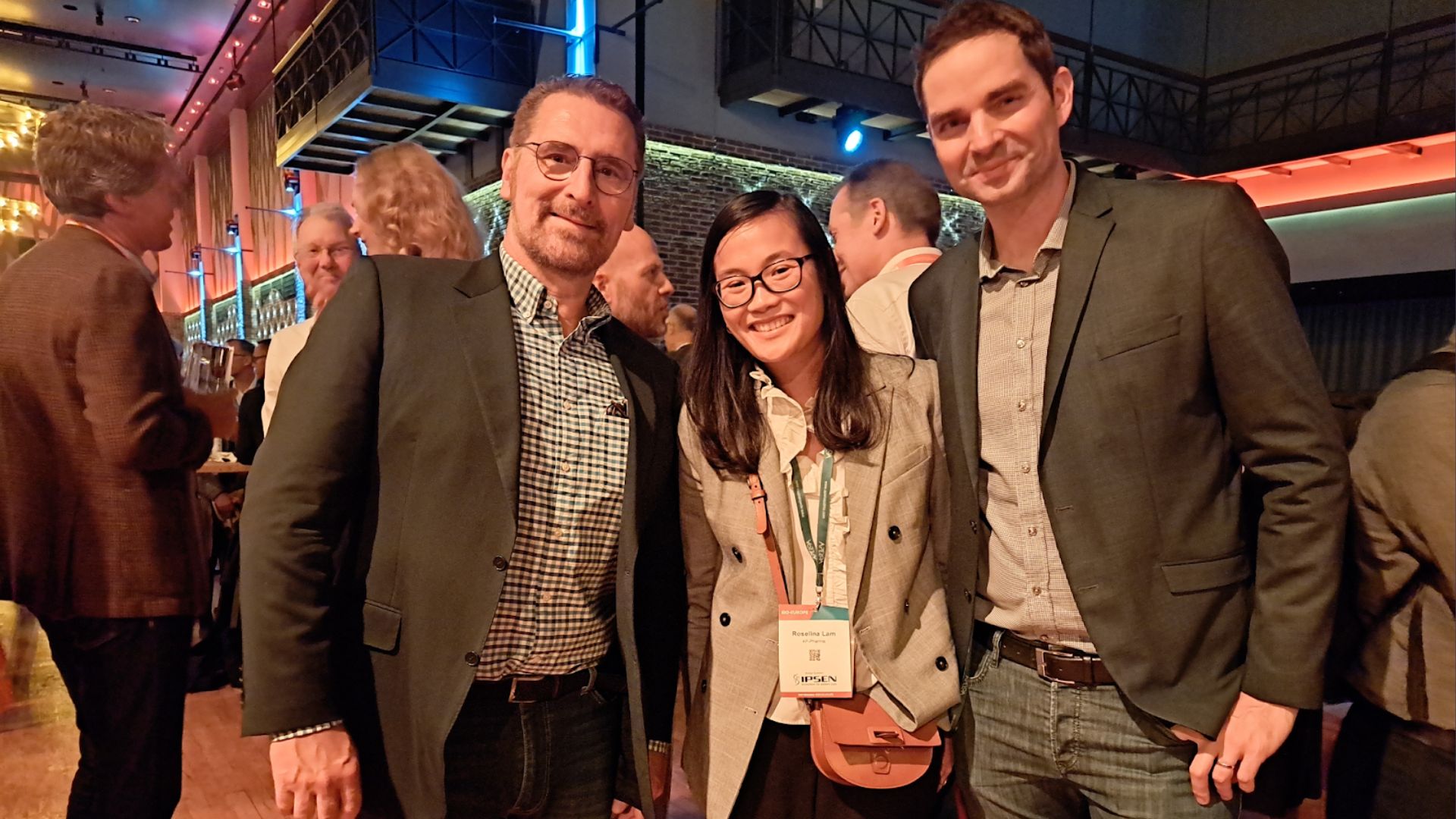Continuing its active engagement with the COST Action PerMediK network, Delta4 participated in the 6th Management Committee Meeting and Action Workshop held in Lisbon, Portugal on March 14–15, 2025. Representing Delta4, Lead Software Engineer Matthias Ley led the opening training session titled “Leveraging Big Data for Chronic Kidney Disease Research: Real-World Use-Cases and Data Skills Development.”
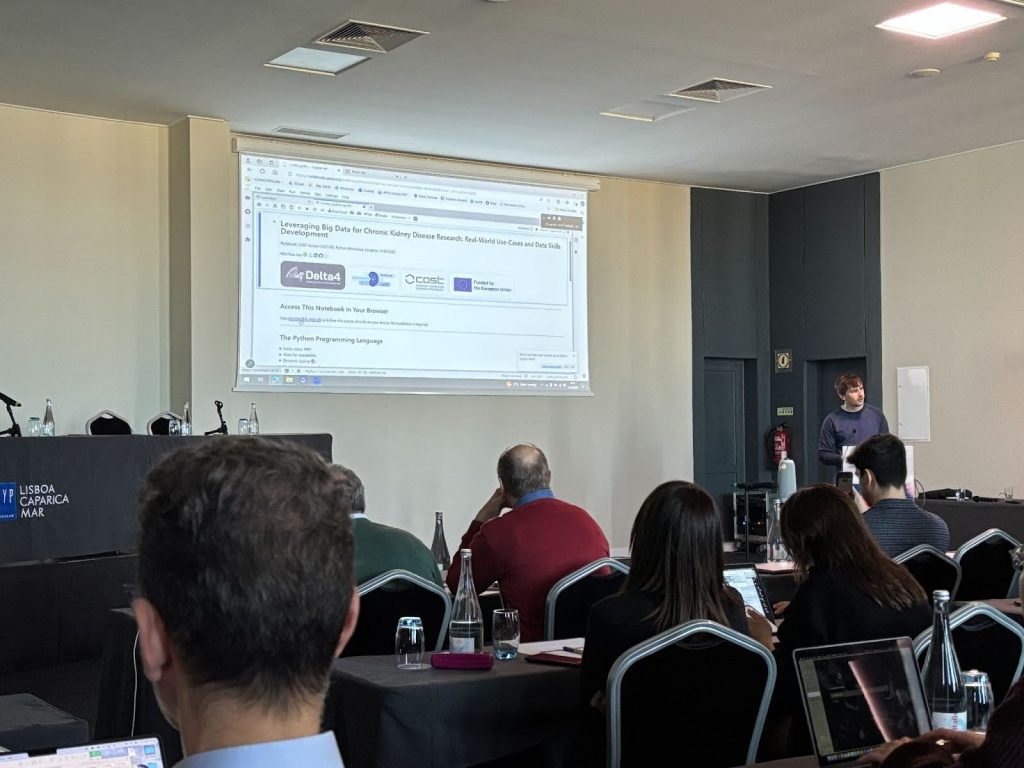
As part of the event’s Python module training, his session provided participants with hands-on insights into how large-scale datasets can be harnessed to uncover new perspectives in chronic kidney disease (CKD) research. The training was especially well-received among researchers, reflecting Delta4’s commitment to advancing education and collaboration in the medical research community.
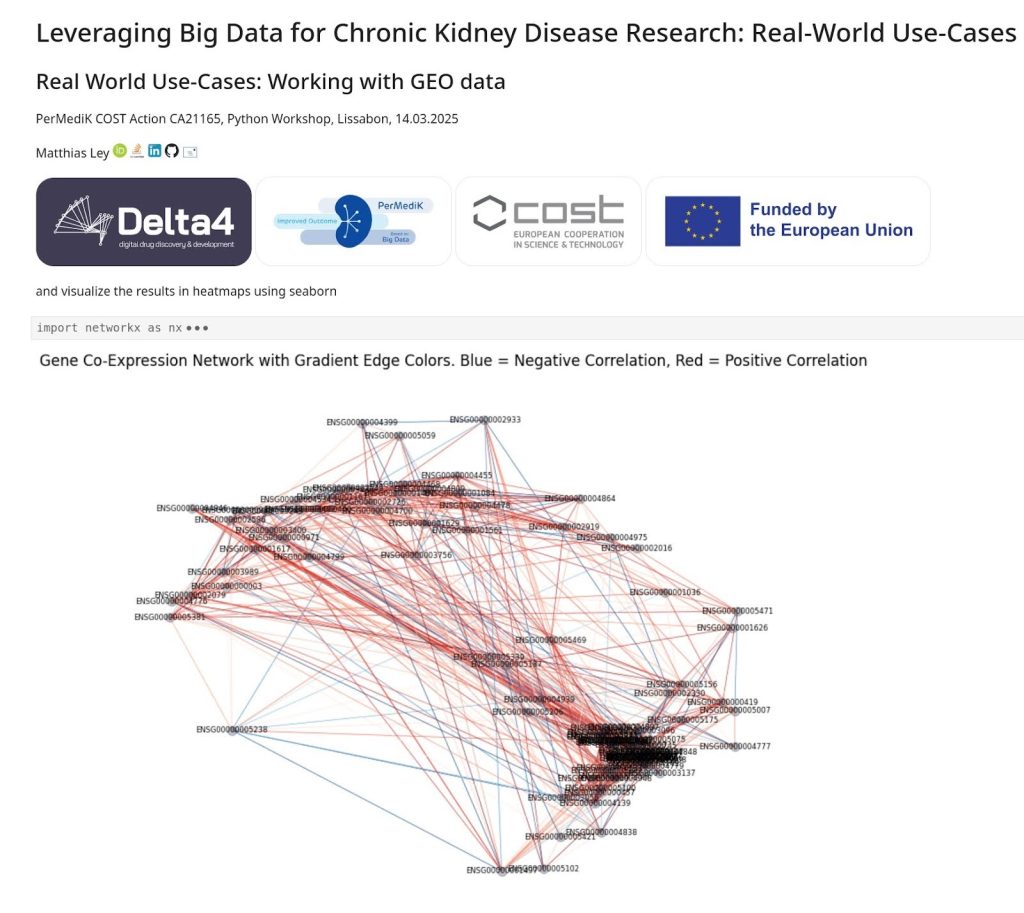
“It was a privilege to present to such a bright and motivated group of researchers,” said Matthias Ley. “Sharing Delta4’s approach to leveraging big data in chronic kidney disease is always exciting, especially when it contributes to pushing the field forward.”
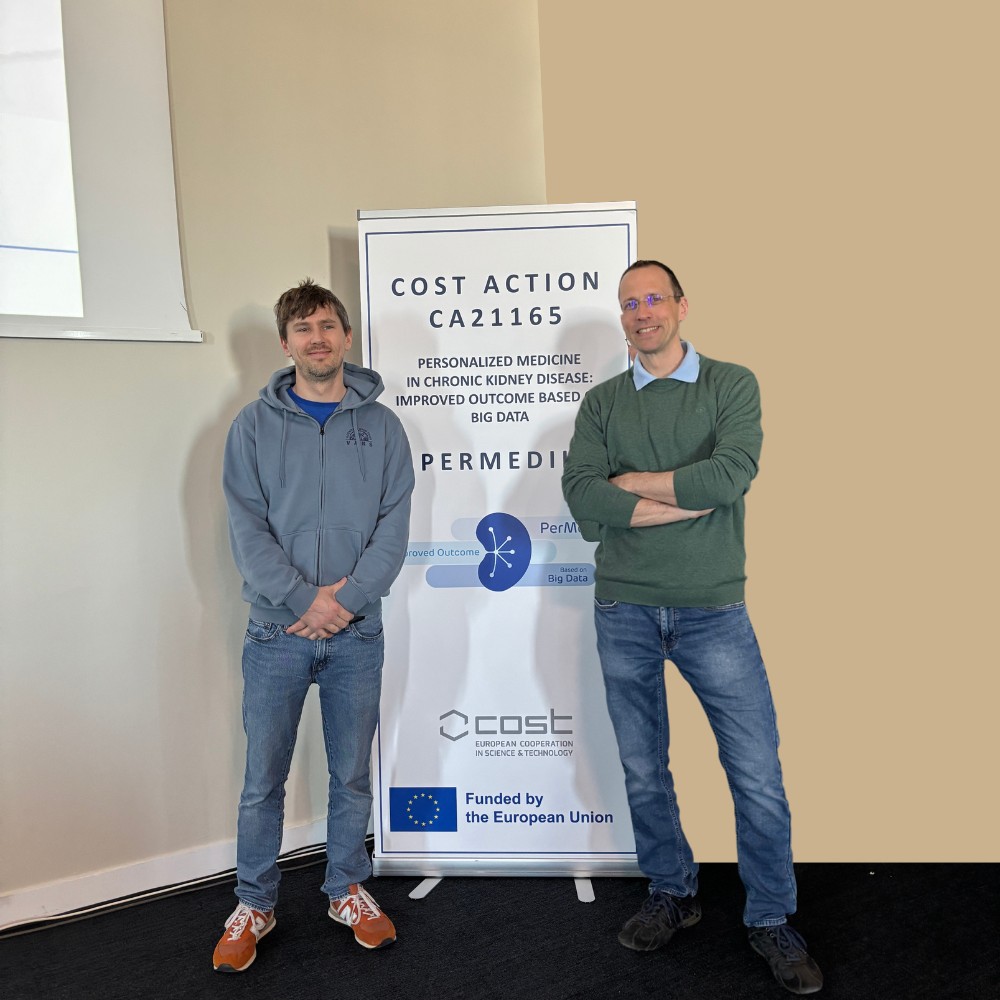
Held at the TRYP Lisboa Caparica Mar Hotel and organized by the NOVA School of Science and Technology in partnership with RWTH Aachen, the workshop brought together leading researchers and clinicians across Europe to discuss the latest developments in personalized medicine and kidney research.
September 2023 – Dr. Paul Perco presents at the COST Action PerMediK 3rd Annual Committee Meeting
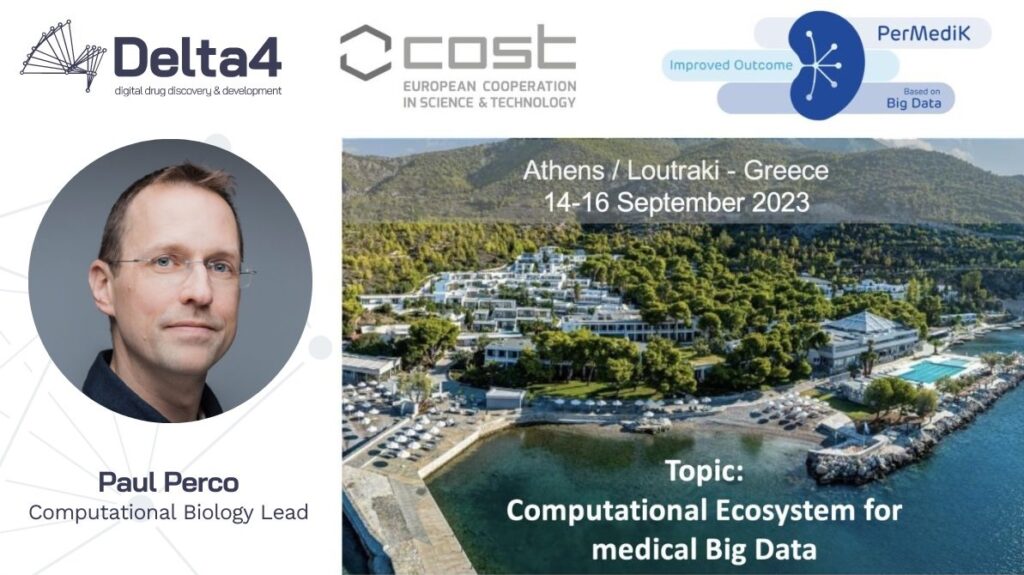
September 2023 – Dr. Paul Perco presents at the COST Action PerMediK 3rd Annual Committee Meeting
From the 14th to the 16th of September, Athens and Loutraki, Greece, played host to the COST Action PerMediK Training School, Action Workshop, and 3rd Annual Committee Meeting. The core theme of this three-day event was “Computational Ecosystems for Medical Big Data.”
Guest professors and researchers from across Europe converged to conduct discussions, workshops, and lectures on a range of topics. These subjects encompassed medical big data structures and their inherent challenges, techniques for ensuring data privacy, biomedical predictive analytics, the application of bioinformatics for drug target and biomarker discovery, as well as the integration of AI and machine learning in the health sciences.
Dr. Paul Perco from Delta4 was one of the distinguished speakers at the event. He captivated the audience with an insightful presentation on “Data-Driven Approaches Supporting Biomarker, Drug Target, and Drug Identification in Chronic Kidney Disease (CKD).”
January 2023 – Delta4 joins the EU-funded COST action PerMediK
Delta4’s Computational Biology Lead Dr. Paul Perco represents Austria in the management committee of PerMediK initiated by Prof Joachim Jankowski from the University Hospital RWTH Aachen (GER). Several renowned institutions are part of this multi-national initiative such as, for example, the Institut national de la santé et de la recherche médicale (Inserm, FRA), the Biomedical Research Foundation Academy of Athens (BRFAA, GRE), or the University of Glasgow (UK).
The kick-off meeting of this 4-year COST action took place in Brussels in October 2022. The following work group meeting is planned for March 2023, organized by Prof Constantinos Deltas from the University of Cyprus.
Delta4 joins the EU-funded COST action PerMediK (Personalized medicine in chronic kidney disease: improved outcome based on Big Data)
The scientific goal of PerMediK is to foster development toward personalized medicine in chronic kidney disease (CKD), based on multidimensional omics data (Big Data).
Ample molecular data, promising therapeutic targets, and markers make it possible to move to the next step of clinical implementation. However, this is stalled by communication gaps, lack of proper multi-disciplinary interactions, and maintenance of isolated rather than coordinated activities.
The PerMediK action provides a multi-disciplinary communication/dissemination platform bringing together a collation of pan-European expertise, representing diverse scientific fields (nephrology, several –omics areas, bioinformatics, biomarker, and drug development), origin (academia, industry, links to policymakers and patient groups), and career levels.
The goal is to allow maximal use of existing resources and coordinate activities on all critical aspects of CKD personalized medicine. The expected impact includes accelerating the introduction of new technologies and therapies for the benefit of CKD patients and promoting European research as a whole.
Frequently Asked Questions
What Is the European Cooperation in Science and Technology?
COST (European Cooperation in Science and Technology) is a funding organization for the creation of research networks, known as COST Actions. These networks provide an open space for researchers to collaborate and coordinate nationally funded research activities.
What Does COST do?
In essence, COST plays a significant role in facilitating transnational cooperation in science and technology, enabling researchers to network, share knowledge, and embark on new pathways together.
Overview of COST and Its Functions:
- Establishment: COST was established in 1971 and is one of Europe’s longest-running mechanisms supporting cooperation among researchers across the continent.
- Networking Focus: Instead of directly funding research projects, COST emphasizes the networking aspect, enabling scientists to collaborate and share their findings, methodologies, and expertise.
- COST Actions: These are the primary tools COST employs. They are network-based, centered around specific topics, and can run for up to four years. Actions bring together researchers from different countries and disciplines.
- Inclusivity: COST encourages broad participation, including early-stage researchers and those from countries that might be considered less research-intensive.
- Bottom-Up Approach: Researchers themselves propose and define COST Actions, ensuring that the topics are genuinely relevant to the scientific community.
- Geographical Reach: While it’s centered in Europe, COST is open to international participation, allowing researchers from non-COST countries to join Actions under certain conditions.
- Benefits: By fostering collaboration, COST helps to break down barriers between scientists, increases the mobility of researchers across Europe, and helps to disseminate research findings more widely.
What is CA21165 – Personalized Medicine In Chronic Kidney Disease (PerMediK)?
PerMediK aims to pave the way for personalized medicine in the field of chronic kidney disease (CKD) by harnessing multidimensional -omics data, commonly known as Big Data. While there exists a substantial amount of molecular data, therapeutic targets, and markers that can propel CKD into the realm of clinical implementation, progress is hindered by communication gaps and a lack of coordinated multidisciplinary interaction.
Objectives and Aims
- Scientific Aim: PerMediK’s primary scientific objective is to create a multi-disciplinary communication platform. This platform will aggregate pan-European expertise from diverse scientific fields, including nephrology, various -omics sectors, bioinformatics, biomarkers, and drug development. Furthermore, it will utilize findings from previous European research initiatives to maximize resource utilization.
- Main Challenge: PerMediK aspires to lay the groundwork for personalized medicine in CKD by integrating both clinical and molecular Big Data. The project seeks to utilize systems biology to identify and track comprehensive molecular features of disease progression, leading to improved patient stratification and risk determination.
- Research Coordination Objectives:
- Harmonize Big Data handling protocols across partners in compliance with the European Union’s General Data Protection Regulation (GDPR).
- Collect data from publicly available multi-omics datasets.
- Engage in bioinformatics disease modeling to develop and test data handling tools.
- Conduct (Pre) clinical confirmation to assess in-silico findings.
- Translate significant findings from Big Data approaches into the context of human disease.
- Establish guidelines for every stage of the Action, including data deposit, curation, and clinical implementation.
- Launch a platform for knowledge sharing and collaboration among research groups.
- Disseminate key guidelines for external consumption.
- Reach out for further validation of findings by collaborating with SMEs and the pharmaceutical industry.
- Capacity Building Objectives:
- Create a collaborative environment among PerMediK partners for international collaborations, knowledge exchange, and training.
- Organize workshops and courses for knowledge transfer and to streamline research initiatives.
- Host consortium meetings and workshop activities for brainstorming and networking.
- Expand the collaborative network, involving Young Researchers and Innovators (YRIs) from various countries.
- Promote the Action’s findings and methodologies via various channels, including social media, meetings, stakeholder groups, and more.
Expected Outcomes: PerMediK’s anticipated impact includes hastening the adoption of new technologies and treatments for CKD patients, addressing a significant global health issue. It seeks to guide future research in personalized medicine, bolster innovation, and build European capacities. Furthermore, PerMediK hopes to educate early-career investigators in precision medicine, disseminate expertise from centers of excellence to underrepresented areas, and enhance European research overall.

